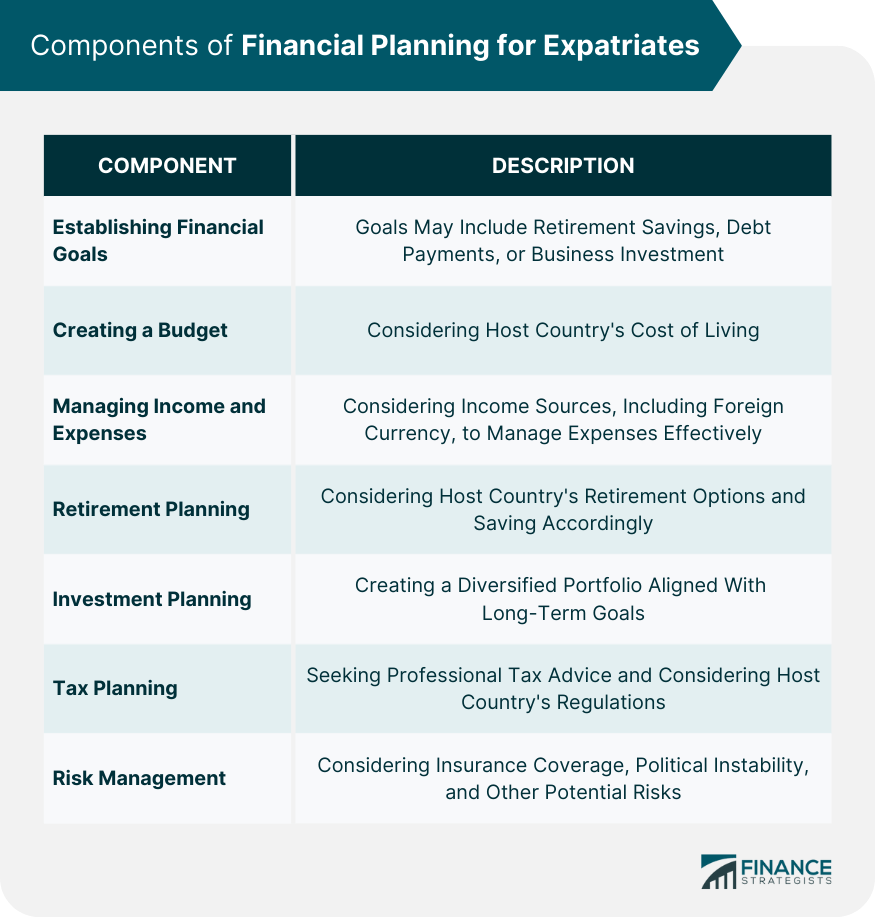Financial planning for expatriates involves creating a strategic plan to manage finances while living abroad. This plan should consider the unique challenges that come with the expatriate lifestyle, such as cultural differences, language barriers, and legal and regulatory issues. Financial planning is essential for expatriates to achieve financial stability and long-term success while living abroad. By prioritizing financial planning, expatriates can manage their finances effectively, maintain their standard of living, and achieve their long-term financial goals.
I'm Taylor Kovar, a Certified Financial Planner (CFP), specializing in helping business owners with strategic financial planning. Once, I assisted an expatriate couple in optimizing their tax situation while living abroad. They were unaware of the tax advantages available through certain investment vehicles and the importance of currency risk management. By restructuring their investments to include tax-efficient savings accounts and diversifying their portfolio to mitigate currency fluctuations, they significantly reduced their tax liabilities and enhanced their savings. Let's navigate the complexities of expatriate financial planning together. Contact me at (936) 899 - 5629 or [email protected] to discuss how we can achieve your financial objectives. WHY WE RECOMMEND: IDEAL CLIENTS: Business Owners, Executives & Medical Professionals FOCUS: Strategic Planning, Alternative Investments, Stock Options & Wealth PreservationDefinition of Financial Planning for Expatriates
Financial planning for expatriates involves creating a comprehensive plan that takes into account various factors such as income, expenses, investments, taxes, and regulatory issues.
It is essential for expatriates to prioritize financial planning to maintain their standard of living and achieve long-term financial stability while living abroad.Read Taylor's Story

Fee-Only Financial Advisor
Certified Financial Planner™
3x Investopedia Top 100 Advisor
Author of The 5 Money Personalities & Keynote Speaker
Understanding the Expatriate Lifestyle
Overview of the Expatriate Lifestyle
The expatriate lifestyle involves living and working outside of one's home country. This lifestyle can be rewarding but also presents unique challenges, such as cultural differences, language barriers, and legal and regulatory issues.
Cost of Living for Expatriates
The cost of living for expatriates can vary significantly depending on their host country. Expatriates should consider the cost of housing, transportation, food, and other essential expenses when creating a financial plan.
Cultural Differences and Language Barriers
Cultural differences and language barriers can impact the expatriate lifestyle and financial planning. Expatriates should research their host country's customs, language, and business practices to avoid misunderstandings and potential financial pitfalls.
Components of Financial Planning for Expatriates
Establishing Financial Goals for Expatriates
Expatriates must identify financial goals to achieve financial stability and success while living abroad. These goals may include saving for retirement, paying off debt, investing in a business, or purchasing property. Establishing clear and realistic goals is crucial in financial planning.
Creating a Budget for Expatriates
Creating a budget is a crucial component of financial planning for expatriates. Expatriates should consider their host country's cost of living, income, and expenses to ensure they are living within their means.
Developing a budget will help expatriates manage their expenses, save money, and achieve their financial goals.
Managing Income and Expenses for Expatriates
Managing income and expenses is a critical component of financial planning for expatriates. Expatriates should consider their income sources, including foreign currency, and create a plan to manage their expenses effectively.
Understanding expenses and managing them efficiently will help expatriates stay within their budget, save money, and achieve their financial goals.
Retirement Planning for Expatriates
Retirement planning is crucial for expatriates to ensure financial stability in their later years. Expatriates should consider their host country's retirement options, such as pension plans, and create a plan to save for retirement.
Setting a retirement goal and creating a savings plan will help expatriates achieve their retirement dreams.
Investment Planning for Expatriates
Investment planning is an important part of financial planning for expatriates. Expatriates should consider their investment options and create a diversified portfolio that aligns with their long-term financial goals. Proper investment planning will help expatriates maximize their returns and build wealth over time.
Tax Planning for Expatriates
Tax planning is crucial for expatriates to ensure compliance with local tax laws and minimize tax liabilities. Expatriates should seek professional tax advice and consider their host country's tax laws and regulations.
Proper tax planning will help expatriates avoid unnecessary tax expenses and keep their finances in order.
Risk Management for Expatriates
Risk management is essential for expatriates to protect their financial well-being. Expatriates should consider their insurance coverage, political instability, and other potential risks and create a plan to mitigate these risks.
A well-designed risk management strategy will help expatriates protect their wealth and secure their financial future.

Challenges and Considerations for Financial Planning for Expatriates
Differences in Currency and Exchange Rates
Differences in currency and exchange rates can impact expatriates' finances significantly. Expatriates should consider foreign exchange rates and create a plan to manage currency fluctuations.
Legal and Regulatory Issues
Legal and regulatory issues can impact expatriates' finances and financial planning. Expatriates should seek professional legal advice and consider their host country's laws and regulations.
Insurance Coverage
Expatriates should consider their insurance coverage, including health insurance and liability insurance, when creating a financial plan.
Political Instability
Political instability can impact expatriates' finances and financial planning. Expatriates should stay informed of political developments in their host country and create a plan to mitigate potential risks.
Social Security and Pension Plans
Expatriates should consider their social security and pension plans when creating a financial plan. Expatriates should research their host country's social security and pension options and create a plan to maximize their benefits.
Strategies for Successful Financial Planning for Expatriates
Seek Professional Advice
Expatriates should seek professional financial advice when creating a financial plan. Professionals such as financial advisors and tax consultants can provide specialized expertise and support.
Utilize Technology
Expatriates should utilize technology to manage their finances effectively. Online banking, budgeting apps, and other financial tools can help expatriates stay organized and manage their finances efficiently.
Stay Informed
Expatriates should stay informed of their host country's customs, laws, and regulations. Staying informed can help expatriates avoid potential financial pitfalls and make informed decisions about their finances.
Be Flexible
Expatriates should remain flexible when managing their finances. The expatriate lifestyle can be unpredictable, and expatriates may need to adjust their financial plan accordingly.
Create an Emergency Fund
Expatriates should create an emergency fund to prepare for unexpected expenses or financial hardships. An emergency fund can provide a safety net during challenging times.

Bottom Line
Financial planning for expatriates is an essential component of the expatriate lifestyle, involving creating a strategic plan to manage finances while living abroad.
This plan should take into account various factors such as income, expenses, investments, taxes, and regulatory issues, to ensure that expatriates can maintain their standard of living and achieve long-term financial stability.
Expatriates should consider challenges such as differences in currency and exchange rates, legal and regulatory issues, insurance coverage, political instability, and social security and pension plans.
By establishing financial goals, creating a budget, managing income and expenses, planning for retirement and investment, tax planning, risk management, seeking professional advice, utilizing technology, staying informed, being flexible, and creating an emergency fund, expatriates can create a successful financial plan.
Overall, financial planning is crucial for expatriates to ensure that they can navigate the unique challenges of the expatriate lifestyle and achieve long-term financial success.
Financial Planning for Expatriates FAQs
Financial planning for expatriates involves creating a comprehensive financial plan to manage income, expenses, retirement planning, and investments while living abroad.
Financial planning is essential for expatriates to manage their finances efficiently, overcome cultural and legal differences, and plan for future financial goals.
Components of financial planning for expatriates include setting financial goals, creating a budget, managing income and expenses, retirement planning, investment planning, tax planning, and risk management.
Expatriates face challenges like differences in currency and exchange rates, legal and regulatory issues, insurance coverage, political instability, and social security and pension plans.
Expatriates can seek professional advice, utilize technology, stay informed, be flexible, and create an emergency fund to ensure successful financial planning while living abroad.
True Tamplin is a published author, public speaker, CEO of UpDigital, and founder of Finance Strategists.
True is a Certified Educator in Personal Finance (CEPF®), author of The Handy Financial Ratios Guide, a member of the Society for Advancing Business Editing and Writing, contributes to his financial education site, Finance Strategists, and has spoken to various financial communities such as the CFA Institute, as well as university students like his Alma mater, Biola University, where he received a bachelor of science in business and data analytics.
To learn more about True, visit his personal website or view his author profiles on Amazon, Nasdaq and Forbes.













